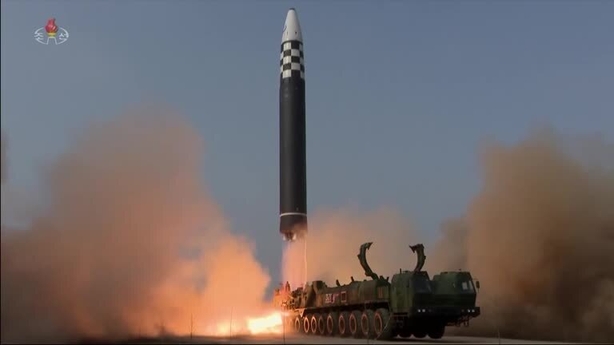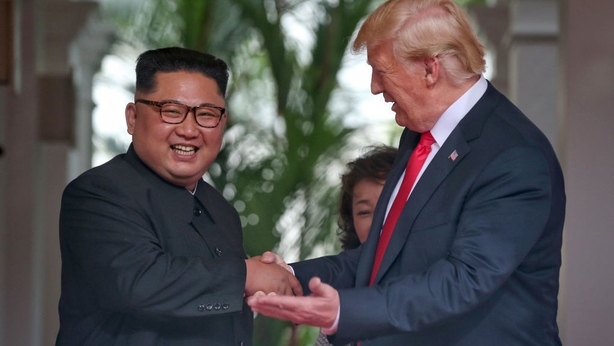The Group of Seven nations and the EU have "strongly condemned" North Korea's latest missile launches, calling them a "blatant violation" of the country's obligations under UN Security Council resolutions.
North Korea's leader Kim Jong-Un personally oversaw the test-firing of the country's "new type" of intercontinental ballistic missile to boost its nuclear deterrent against the US "imperialists", state media reported.
"These reckless actions threaten regional and international peace and security," G7 foreign ministers and the High Representative of the European Union said in a joint statement.
The launch yesterday was the first time Pyongyang has fired Mr Kim's most powerful missiles at full range since 2017, and it appears to have travelled higher and further than any previous ICBM tested by the nuclear-armed country.
The test launch of the "new type inter-continental ballistic missile" the Hwasong-17 was conducted under the "direct guidance" of leader Mr Kim, KCNA reported.
The Hwasong-17 is a giant ICBM first unveiled in October 2020 and dubbed a "monster missile" by analysts.
It had never previously been successfully test fired, and the launch prompted immediate outrage from Pyongyang's neighbours and the United States.
North Korean leader Kim Jong-Un observed the test-firing of the country's "new type" of intercontinental ballistic missile, dubbed the Hwasong-17, to boost its nuclear deterrent against the US "imperialists", state media reported | Read more: https://t.co/Mcvn8vHwiz pic.twitter.com/CxPQ6Ml6jA
— RTÉ News (@rtenews) March 25, 2022
State media carried photographs of Mr Kim, wearing his customary black leather jacket and dark sunglasses, walking across the tarmac in front of a large missile carried on an 11-axle transporter.
"The missile, launched at Pyongyang International Airport, travelled up to a maximum altitude of 6,248.5 km and flew a distance of 1,090 km for 4,052s before accurately hitting the pre-set area in open waters" in the Sea of Japan, KCNA said.
South Korea's military had estimated the range of the launch yesterday as 6,200km - far longer than the last ICBM, the Hwasong-15, North Korea tested in October 2017.
The missile landed in Japanese exclusive economic zone waters, prompting anger from Tokyo, but KCNA said the launch had been carried out "in a vertical launch mode in consideration of the security of neighboring countries".
North Korea is under biting international sanctions for its weapons programmes, and the UN Security Council will hold an emergency meeting over the launch today.

Seoul, Washington and UN chief Antonio Guterres have all denounced the launch as a "clear violation" of Security Council resolutions, while Japan said it threatened "peace and safety" in the region.
The launch, one of nearly a dozen North Korean weapons test so far this year, marked a dramatic return to long-range testing by the nuclear-armed country.
Mr Kim said the new weapon would "creditably perform its mission and duty as a powerful nuclear war deterrent," according to KCNA.
He "remarked with pride that the emergence of the new strategic weapon of the DPRK would make the whole world clearly aware of the power of our strategic armed forces once again," KCNA reported.
KCNA said that the successful test-firing of the Hwasong-17 meant North Korea was ready for long-term confrontation with the United States.
Mr Kim said his country now has "formidable military and technical capabilities unperturbed by any military threat and blackmail" and would be "fully ready for long-standing confrontation with the US imperialists," KCNA reported.
Long-range and nuclear tests have been paused since Kim met then-US president Donald Trump for a bout of doomed diplomacy, which collapsed in 2019.

But North Korea threatened earlier this year it could abandon a self-imposed moratorium on such testing, and the US and South Korea had warned this month Pyongyang was preparing to launch an ICBM at full range.
North Korea has long coveted an ICBM that can carry multiple warheads and, Seoul and Washington say, has been testing the Hwasong-17 under cover of developing a "reconnaissance satellite".
Last week, a test likely of the Hwasong-17 ended in failure, exploding in the skies over the capital shortly after launch.
KCNA said that the successful launch yesterday "clearly proved that all the parameters of the weapon system exactly met the design requirements" and that its "prompt operation" could now be guaranteed even "under wartime environment and condition".
Analysts say the drive to successfully test-fire the Hwasong-17 is part of Pyongyang's preparations to mark the 110th anniversary of the birth of founder Kim Il Sung on 15 April.
North Korea typically celebrates key domestic anniversaries linked to the Kim regime with weapons tests and military parades.

